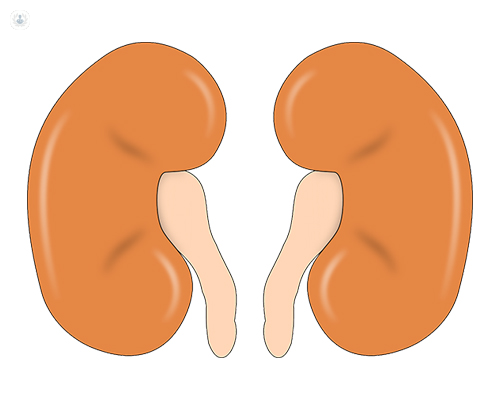Understanding kidney stones: A consultant urologist's guide
Escrito por:As a urological surgeon specialising in kidney and ureteric stone treatment, consultant urological surgeon Mr Ivo Dukic is often asked questions about the management of kidney stones. Here, he gives a short guide to help you understand more about kidney stone disease, including its symptoms, causes and management.

What are the symptoms of kidney stones?
Kidney stones may not cause symptoms until they move within your kidney or pass into your ureter. When this happens, you might experience:
- Severe pain in the side and back, below the ribs
- Pain that radiates to the lower abdomen and groin
- Painful urination
- Pink, red, or brown urine
- Nausea and vomiting
- Persistent urge to urinate
- Urinating more often or in small amounts
What causes kidney stones?
Kidney stones form when your urine contains more crystal-forming substances than the fluid in your urine can dilute. The most common type of crystal is calcium oxalate. Here's what increases your risk:
- Not drinking enough water
- Eating a diet high in animal protein, oxalates, salt or not containing calcium
- Being overweight
- Certain medical conditions (inflammatory bowel disease, hyperparathyroidism)
- Certain supplements and medications
How are kidney stones diagnosed?
To diagnose kidney stones, your doctor may recommend:
- Blood tests to check for too much calcium or uric acid
- Urine tests to see if you're excreting too many stone-forming minerals
- Imaging tests like CT scans or ultrasound scans to visualize stones
- Analysis of passed stones to determine their type
What are the treatments for kidney stones?
Treatment depends on the stone's size and type. Options include:
- Drinking water to help flush the stone
- Pain relievers
- Procedures like lithotripsy (breaking the stone with sound waves)
- Surgery in more severe cases such as ureteroscopy or percutaneous nephrolithotomy
Can I prevent kidney stones?
Preventing kidney stones is not guaranteed, but these steps may reduce your risk:
- Drink plenty of water (at least 2.5 litres throughout the day)
- Eat fewer oxalate-rich foods
- Choose a diet low in salt and animal protein
- Avoid calcium supplements, but get enough calcium from food
What to do If you suspect a kidney stone?
If you think you have a kidney stone:
- Consult a doctor, especially if you have severe pain, blood in your urine, or difficulty passing urine
- Drink water to try and flush out the stone
- Take over-the-counter pain relief as necessary
Remember, each individual is different, and what works for one may not work for another. If you're concerned about kidney stones, talk to a healthcare professional for personalised advice.
Mr Ivo Dukic is a consultant urological surgeon who specialises in kidney and ureteric stone surgery, as well as general urology at Priory Hospital, Circle Health, Edgbaston, Birmingham and Stourside Hospital, Ramsay Healthcare, Stourbridge. You can book a consultation with Mr Dukic on his Top Doctors profile.


